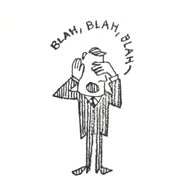Uit: Language in Thought and Action,
door S.I. Hayakawa.
Chapter 4 Contexts
Extensional and Intensional Meaning
 Dictionaries
deal with the world of intensional meanings, but there is another world which a
dictionary by its very nature ignores: the world of extensional meanings. The
extensional meaning of an utterance is that which it points to in the
extensional (physical) world, referred to in Chapter 2. That is to say, the
extensional meaning cannot be expressed in words, because it is that which words
stand for. An easy way to remember this is to put your hand over your mouth and
point whenever you are asked to give an extensional meaning. Dictionaries
deal with the world of intensional meanings, but there is another world which a
dictionary by its very nature ignores: the world of extensional meanings. The
extensional meaning of an utterance is that which it points to in the
extensional (physical) world, referred to in Chapter 2. That is to say, the
extensional meaning cannot be expressed in words, because it is that which words
stand for. An easy way to remember this is to put your hand over your mouth and
point whenever you are asked to give an extensional meaning.
Of course, we cannot always point to the extensional meanings
of the words we use. Therefore, so long as we are discussing meanings, we shall
refer to that which is being talked about as the denotation of an utterance. For
example, the denotation of the word "Winnipeg" is the prairie city of that name
in southern Manitoba; the denotation of the word "dog" is a class of animals
which includes dog1 (Fido), dog2
(Rex), dogs3 (Rover) ... dogn.
 The intensional meaning of a word or expression, on the other hand, is that
which is suggested (connoted) inside one's head. Roughly speaking, whenever we
express the meaning of words by uttering more words, we are giving intensional
meaning, or connotations. To remember this, put your hand over your eyes and let
the words spin around in your head.
The intensional meaning of a word or expression, on the other hand, is that
which is suggested (connoted) inside one's head. Roughly speaking, whenever we
express the meaning of words by uttering more words, we are giving intensional
meaning, or connotations. To remember this, put your hand over your eyes and let
the words spin around in your head.
Utterances may have, of course, both extensional and
intensional meaning. If they have no intensional meaning at all-that is, if they
start no notions whatever spinning about in our heads-they are meaningless
noises, like foreign languages that we do not understand. On the other hand, it
is possible for utterances to have no extensional meaning at all, in spite of
the fact that they may start many notions spinning about in our heads. The
statement, "Angels watch over my bed at night," is one that has intensional but
no extensional meaning. This does not mean that there are no angels watching
over my bed at night. When we say that the statement has no extensional meaning,
we are merely saying that we cannot see, touch, photograph, or in any scientific
manner detect the presence of angels. The result is that, if an argument 'begins
on the subject whether or not angels watch over my bed, there is no way of
ending the argument to the satisfaction of all disputants, the Christians and
the non-Christians, the pious and the agnostic, the mystical and the scientific.
Therefore, whether we believe in angels or not, knowing in advance that any
argument on the subject will be both endless and futile, we can avoid getting
into fights about it.
When, on the other hand, statements have extensional content,
as when we say, "This room is fifteen feet long," arguments can come to a close.
No matter how many guesses there are about the length of the room, all
discussion ceases when someone produces a tape measure. This, then, is the
important difference between extensional and intensional meanings: namely, when
utterances have extensional meanings, discussion can be ended and agreement
reached; when utterances have intensional meanings only and no extensional
meanings, arguments may, and often do, go on indefinitely. Such arguments can
result only in conflict. Among individuals, they may result in the breaking up
of friendships; in society, they often split organizations into bitterly opposed
groups; among nations, they may aggravate existing tensions so seriously as to
become real obstacles to the peaceful settling of disputes.
Arguments of this kind may be termed "non-sense arguments,"
because they are based on utterances about which no sense data can be collected.
Needless to say, there are occasions when the hyphen may be omitted - that depends
on one's feelings toward the particular argument under consideration. The reader
is requested to provide his own examples of "non-sense arguments." Even the
foregoing example of the angels may give offense to some people, despite the
fact that no attempt is made to deny or affirm the existence of angels. Imagine,
then, the uproar that might result from giving a number of examples from
theology, politics, law, economics, literary criticism, and other fields in
which it is not customary to distinguish clearly sense from non-sense.
=============================
Voorbeelden op deze website hier
 .
.
Naar Hayakawa, contents  , Algemene semantiek lijst
, Algemene semantiek lijst  , Algemene semantiek overzicht
, Algemene semantiek overzicht  , of site home
, of site home
 . .
|